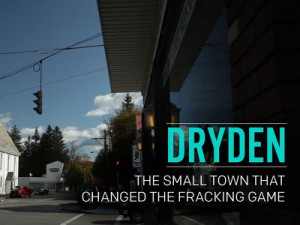The fracking industry has been widely deregulated at the federal level—with exemptions from key provisions of the Safe Drinking Water Act, the Clean Water Act, the Clean Air Act, the Emergency Planning, and Community Right to Know Act, among others. And too often, state regulation of the practice is lax, with state regulators unable or unwilling to crack down.
As fracking and drilling edges closer and closer to the places where people live, work, and play, communities in the frontlines of the fracking rush have been forced to defend themselves from oil and gas industry abuse.
In communities across the country, people are standing up to this powerful industry, passing bans and limits on fracking and defending their right to do so in court. And when the oil and gas industry tries to bully communities into backing down, communities are fighting back—and winning.
Earthjustice, a public interest law organization, has been tracking these fights and, in some cases, joining the court fight. Here’s a quick look at some of the good news that’s out there in the fight against fracking.
New York
In 2011, the town board of Dryden voted to clarify that oil and gas development—including fracking—would not be permitted within town borders under the town’s zoning ordinance.
The town was one of the first communities in New York State to do so. Six weeks later, Dryden was sued by a billionaire-owned oil and gas company. With the help of Earthjustice, the town has won two rounds in court, and its ban remains in effect.
In recent years, more than 170 communities in New York State have joined Dryden in passing bans or moratoriums on fracking (watch Dryden: The Small Town that Changed the Fracking Game, a beautiful 11-minute video).
Pennsylvania
When Pennsylvania Governor Tom Corbett—the recipient of nearly $1 million in campaign contributions from the oil and gas industry—signed a pro-fracking, anti-community law known as Act 13 in 2012, communities fought back.
A group of seven municipalities sued to overturn a portion of the law that sought to strip communities of their right to use local zoning laws to limit oil and gas development and associated industry infrastructure. In a landmark 2013 court victory, Pennsylvania’s Supreme Court sided with the municipalities, handing the oil and gas industry a big defeat.
Ohio
The City of Munroe Falls has a longstanding law on the books outlawing oil and gas drilling in certain sections of the city. When an oil and gas company ignored the city’s law and began operations in a residential neighborhood, the city sued to uphold its law, winning in the lower court, but losing the subsequent appeal. Both sides are awaiting a final decision by the state Supreme Court.
Colorado
In July 2012, Longmont City Council passed a set of regulations governing fracking within city limits. And in November 2012, voters approved an all-out ban of the practice. The Colorado Oil and Gas Association is suing to overturn both efforts.
Colorado Governor John Hickenlooper, who drank a glass of fracking fluid with a group of oil and gas industry executives and described it as “ritual like,” is joining the industry lawsuit. Undeterred by powerful forces aligned against them, voters in four more Colorado communities—Lafayette, Broomfield, Boulder, and Fort Collins—placed local measures to ban fracking on the ballot in the November 2013 election. Community members were outspent by 40 to 1. In spite of this, all four ballot measures passed.
California
In 2013, California Governor Jerry Brown signed a controversial bill allowing fracking to proceed in the state without an environmental review. Concerned communities in the state have started to take matters into their own hands.
In February 2014, the City of Los Angeles unanimously voted to approve a moratorium on fracking and other unconventional oil extraction techniques, becoming the largest city in the country to pass such a measure. Carson and Santa Cruz Counties have approved moratoriums on fracking as well. Similar actions by additional communities are expected, because California law allows municipalities to adopt oil and gas industry regulations as well as to prohibit the industry through zoning.
Texas
In oil-and-gas-friendly Texas, communities are growing weary of the industry’s creeping presence into residential areas. In December 2013, the City of Dallas approved a strict zoning ordinance that prohibits wells less than 1,500 feet from homes, in what amounted to a de-facto fracking ban in the city.
An effort to ban the practice is underway in the City of Denton, home to 120,000 residents and 270 gas wells.
Related reading: No Boom without Bust: Against enormous odds, an activist fights fracking in his hometown


